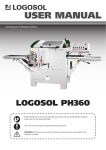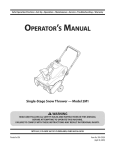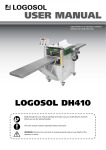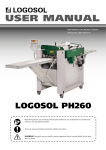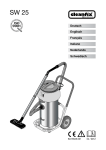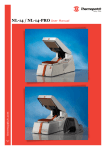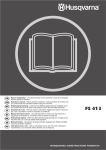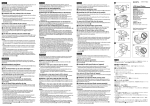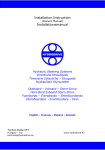Download USER MANUAL - Logosol USA
Transcript
USER MANUAL User manual in original format. Article no: 0458-395-0802 LOGOSOL PH360 Read through the user manual carefully and make sure you understand its contents before you use the planer/moulder. This user manual contains important safety instructions Warning! Incorrect use can result in serious personal injury or even death to the operator or others. Thank you for choosing a Logosol machine! Welcome! We are very pleased that you have demonstrated your confidence in us by purchasing this planer/moulder and we will do our utmost to meet your expectations. Logosol has been manufacturing sawmills since 1988, and since then we have supplied machines to satisfied customers worldwide. We are want to assist you in safely achieving the very best possible results from your planer/molder. We therefore recommend that you take the time to read this user manual from cover to cover before you begin using the machine. Remember that the planer/moulder itself is just part of the value of the product. Much of the value is also to be found in the expertise we pass on to you in the user manuals. It would be a pity if that were not utilized. We hope you get a lot of satisfaction from the use of your planer/moulder. Bengt-Olov Byström Founder and Chairman of the Board, Logosol AB LOGOSOL is engaged in continuous development of its products. We must therefore reserve the right to change the design and form of our products. Text: Bo Mårtensson Document: Logosol PH360 Manual Image: Bo Mårtensson, Lars Wahlström Last Revised: September 2014 Manual, product no. 0458-395-0802 © 2010 LOGOSOL, Härnösand Sweden 2 LOGOSOL PH360 Table of contents Safety instructions 4 Tools required 6 Machine description 7 Preparations 7 Setup 8 Chip management 8 In and outfeed table 9 Starting the sawmill 9 Control panel 10 Bottom cutter 11 Top cutter 13 Molding knife in bottom and top cutter 15 Side cutters 16 Instruction variable 20 Maintenance 21 Setting the upper chassis' plan 22 Molding tips 22 Starter package PH360: molding knives & examples of combinations 23 Electrical schematic 26 Technical data 29 List of components 30 Overview 32 EC Declaration 43 3 Safety instructions • • Make sure that all warning and information stickers are in place, and that they are clean and legible. Any damaged stickers must be replaced immediately. Persons who do not have the necessary knowledge or experience of planers must not use this planer/moulder. This instructions do not constitute training in machine planing. Contact Logosol for information regarding training in machine planing. • Ensure that non-authorized persons do not use this moulder. • All protection must be assembled before the molder is used. • Always use protective goggles and ear protection. • • Never use the molder if you are under the influence of strong medication, alcohol or any other strong drugs. Always check that knobs, screws, nuts, fences, sleeves, planing cutters, planing knives, etc. are properly tightened. Also check that the cutter can rotate freely and that there are no tools in or on the planer/moulder before it is started. • Never use the planer/moulder in poor visual conditions such as bad lighting. • Never place tools or hands into the in or outfeed areas when the planer/moulder is running. • Never intervene in the planer/moulder before you have ensured that the power is switched off and the planer/moulder cannot be started accidentally. Planing/moulding 4 • Always measure the workpiece and set suitable thickness and width before planing. • There is a high risk of accident if you feed in a workpiece that is not high enough for the feed rollers to get hold of the workpiece. • • Small dimensions must be planed using fixtures, e.g. a piece of wood with a customized groove that extends along the full length of the table. Never stand along the the workpiece's extension line as kickback can occur, and bits of the workpiece can be thrown out of the planer/moulder. This applies to both the in and outfeed sides, although the risk is greater on the infeed side. Key to symbols For your own safety, read the entire instruction manual carefully and do not start the planer/moulder before you have understood everything. Use approved ear protection and protective goggles. Hearing can be damaged after only a short exposure Sharp rotating tools. Be careful not to let your fingers get near the cutter. This symbol means "WARNING!". Be extra vigilant when this symbol appears in the manual text. This symbol is followed by a prompt. Be extra vigilant when this symbol appears in the manual text. LOGOSOL PH360 General • • • Check the molder/planer as soon as you receive it. Report any transport damage to the transport company immediately. LIFT THE PLANER/MOULDER using a fork-lift or pallet jack. When replacing spare parts, use only original parts and note that anything electrical must be assembled by a qualified electrician. Applications The planer/moulder can be used for planing/molding and planing wood, chipboard, board, etc. Hard materials such as chipboard, teak, MDF, etc. require hard carbide tools, see the Logosol-Toolbox catalogue. The planer/moulder is designed for indoor use, with temporary outdoor use. Environmental requirements The temperature in the premises should be above freezing, unless special measures are taken. Safety distance Other than the operator, no-one should be within 3 meters (10 foot) of the planer/ moulder's sides or 8 meters (26 foot) from the in and outfeed sides during operation. Mark a limit that prevents anyone accidentally wandering into the risk area. Demarcation PH360 with in and outfeed table 3 m (10 ft) Risk area Max 8 m (26 ft) 6 m (20 ft) The operator's work area The barrier behind the infeed side 3m (10 ft) Tips: An extended infeed table is practical to use, and prevents anyone coming into the risk area. Ventilation in the premises must be mechanical, and of a good standard. The planer/moulder must be connected to a chip extractor, which is approved according to CE-standards, see page 10. 5 tools required A list of the tools required to be able to work with the planer/moulder: The following spacer ringers are supplied: Allen key 4 mm (supplied) Allen key 5 mm Allen key 6 mm Open ended wrench 10 mm (supplied) Wrench 10 mm Ring wrench 13 mm Open ended wrench 30 mm (supplied) (for milling spindle) Adjustable wrench 8" or 10" (for milling spindle) Sliding caliper Measuring tape or ruler Paraffin oil for the table Whetstone 3 x 40 mm height 2 x 20 mm height 2 x 10 mm height 1 x 5 mm height 2 x 2 mm height 1 x 1 mm height 1 x 0.5 mm height 1 x 0.3 mm height 1 x 0.2 mm height 1 x 0.1 mm height per cutter These spacer rings allow you to set the required height. Tips! Make a tool board with the tools you need, and position it next to the planer/moulder so that you can see it easily. Look at the tool board before you start the planer/moulder to see if any tools are missing. They could have been left in the planer/moulder! Machine description The PH360 is a planer/moulder that can work four sides of a workpiece in one action. The planer/moulder is contained in a stable and strong chassis. The planer/moulder table and slide for the moving cutter are made of planed cast iron. The workpiece is fed, lying on the planer table, through the planer by four feed rollers as well as an outfeed roller. The rollers are driven by a chain transmission with separate motor. The workpiece is controlled laterally with adjustable fences and pressure rollers. The work is done using a top cutter and a bottom cutter, that are hung at both ends, as well as two side cutters which are fixed to the planer table. All the cutters are driven by separate motors, via a belt transmission. 6 The cutters and feed rollers are covered by a foldable protective cover plate with window. The cover plate is supplied with a safety switch. Another safety switch sits behind the top edge of the cover plate on the infeed side. A 100 mm (4”) hose is connected to the bottom and side cutters and a 125 mm (5”) hose is connected to the top cutter with the option of an additional 100 mm (4”) for connection to the chip extractor. Table surface The table is cast in the highest quality. The table surface is specially processed for the highest precision and the best anti-friction qualities. When the planer/ moulder is new, it requires a driving-in period until the table gets a slightly shinier surface to optimize the anti-friction qualities. During this period, we recommend that you use a lubricant or wax on the table. LOGOSOL PH360 preparations Certain parts are not assembled on delivery for transport and packaging reasons. Figure 1. 1. Assemble the control panel in place with the arm where the cabling goes, (232), (251). 2. Assemble all safety doors. 3. Assemble the infeed table (212). [Figure 1] • Screw down all adjustable screws (B) in the bottom. • Insert all screws (A) tighten by hand. • Insert the adjustment screws (C) and adjust the table so it is straight. • Adjust exactly: The highest position of the infeed table must be on the same level as the cast machine table. Check with a long, straight fence rail. • Adjust the height of the table so that it touches the cast iron table with the adjustment screws (B) and tighten the holding screws (A). • Check the table angle and table height and insert the table fixture’s bottom lock screws (D) which are fastened using nuts on the inside of the chassis. 4. Assemble the outfeed table (253). [Figure 2] 5. Assemble the side fences [Figure 3] 6. Connect the planer/moulder to the chip extractor. 7. Before the planer/moulder is connected to the electrical circuit, check that all cutters can rotate freely, and that all parts are fixed. Hole pattern key: A: Holding screws for the infeed table. B: Holes for accessing the adjusting screws where the screw head lies under the table fixture. C: Threaded hole for adjustment screws for setting the table angle. D: Hole for lock screws. E: Fixing point for adjustable side fence. A double hole pattern 39 means that the fence can be placed in an outer or inner position 41 25 24 27 26 42 16 16 16 42 16 14 15 Figure 3. 22 38 41 22 22 1 Insex M10 15mm 3 Bricka 10,8x22x2 41 1 40 1 39 1 38 1 Tap-GN30078-M10x20-Wiberger 14 Passkruv ISO7379 d12 L45 M10 17 Distans 15 bussning Automatstål 27 1 Passkruv ISO7379 d12 L20 M10 26 1 Insex M10 40mm 25 1 Passkruv ISO7379 d12 L25 M10 24 1 Annhåll låsplåt 23 1 Annhåll låsplåt Distans bussning 22 3 Fästbusning annhåll Oljebrons 19 1 Annhåll profil 3 AL 17 2 Mutter M12 16 5 1 Annhåll justerspak Stål Blankförzinkad 22 Bricka 11x22x3 15 14 2 Länkarm inmatning Automatstål Plattstång 25x25 L80 13 13 2 Fäste länkarm Automatstål Stång D30 L36 360-124-3 Nr. Antal Dimension Anmärkning 42 43 Konstr. _ M10 Ritad MK M10-30mm 24 Stål 16 Blankförzinkad Bricka 13x24x2 Benämning Kop. _ Kontr. _ Stand. _ 16 42 Stång D30 L11 360-342 1312 Plåt 4mm 360-167-2 Automatstål Stång D30 L25 360-134-1 Lager d12 D18 L25 AL-profil:360-325 40x30x800 360-125-1 Material Godk. _ 39 Bricka 11x22x3 Lever-GN300-S78-Wiberger 16 MOReTENs M10-25mm 27 26 42 42 13 M10-25mm 25 43 23 Figure 2. PH360 19 14 17 Skala 1:20 Matarbord Ass 16 22 38 360-329 22 23 360-142-3 43 1 42 3 Bricka 10,8x22x2 41 1 Lever-GN300-S78-Wiberger Insex M10 15mm 40 1 Tap-GN30078-M10x20-Wiberger Passkruv ISO7379 d12 L45 M10 Ersatt av 39 1 _ 38 1 Distans bussning Blad. Dat. 27 1 Passkruv ISO7379 d12 L20 M10 26 1 Insex M10 40mm 25 1 Passkruv ISO7379 d12 L25 M10 24 1 Annhåll låsplåt 23 1 Annhåll låsplåt Distans bussning Automa 22 3 Fästbusning annhåll Oljebr 19 1 Annhåll profil 3 17 2 Mutter M12 16 5 15 1 Annhåll justerspak 14 2 Länkarm inmatning 13 2 Fäste länkarm Nr. Antal Benämning _ 1 av 1 2010-11-15 360-277 43 Konstr. _ Ritad MK Automa 131 AL Bricka 13x24x2 Kop. _ Kontr. _ MOReTENs M10-25mm Stål Blankf Ersätter Ritn.-nr 42 19 14 Stål Blankf Automa Automa Stand. _ Mate Godk. _ Matarbord M10-25mm M10 M10-30mm 7 setup Check your PH360 as soon as you receive it. Any transport damage must be reported to the transport company immediately. Most of the planer/moulder is protected against rust, but it will require extra maintenance in the form of lubrication for all the parts not protected against rust. See the Maintenance section. • • • Place the planer on a stable and flat base. Preferably screw the planer down using the holes in the base, if the castor set is not used. Ensure that there is enough space for the longest boards you want to plane at the in and outfeed sides, and that there is enough space for maintenance and timber stocks. Connect the chip hoses and fix using the hose clips on the planer and fan. • Hang the planer's electrical cable on the ceiling or protect it in another way. Never step on the cable. The planer/moulder should be connected via an earth-fault protection switch. • Ensure that lighting is good. There should also be good general lighting. Also set up a strong lamp directly over the planer. Ensure that there is no risk of glare. Space requirements The planer/moulder needs a space of at least 2 m (6 1/2 ft) wide. The length required depends on the length of the workpieces you want to plane. The minimum length is 4 m (13 ft). Anchoring For the highest safety, the planer/moulder must be anchored to the floor using screws. Screw diameter 8-10 mm (3/10"- 4/10"). chip management The PH360 must be connected to a chip fan with a capacity of at least 3,000 m3/h (10,000 cubic feet/ hr) . Logosol has a range of pipes, sleeves and hoses. Ask our advice. Remember that you need an air vent in your chip container (e.g. a fine net or filter if you carry out chip collection indoors). Poor suction is often due to poor airflow from the chip container. If you work in heated premises, remember that the fan will quickly cool the space if you do not lead the filtered air back into the building. Consideration must be taken for fire risk and dust emissions (discharge) in connection with chip collection. Technical requirements chip extractor • The chip extractor must be approved according to the CE-standard. • The airflow "without external connection" must be approx. 4000-5000 m3/hour (13,000-16,500 cubic feet/hour). • (The manufacturer's standard indication of airflow.) Fire risk and dust emission in connection with chip management. • The sleeve diameters for the planer = 100 mm (4”) x 4 and 125 mm (5") x 1. Contact the local authorities for advice in designing a chip collection system to conform with rules in your area. • The pressure loss in the planer is 26 mm of water column at 25 m/s (1 inch of water column at 82 ft/s) . Position the chip fan so that you can easily reach the switch. 8 Chips that are left in the planer/moulder must be vacuumed up after every work session. LOGOSOL PH360 In and outfeed table Note that the outfeed table can easily be folded up so you can move around the planer. The tables must mainly be completely in line with one another (when the cut in the bottom cutter is 0 mm (0") but in certain cases it can be an advantage for the ends of the feed table to lie slightly higher (1-5 mm) than the planer table to reduce in and outfeed marks (snipe). This particularly applies when thin or soft workpieces are being processed. The outer edges must then always lie slightly higher than the planer table. It is extremely important that the infeed table, planer table and outfeed table are correctly setup so that there are no cutter marks on the ends of the object. Starting the planer Risk of serious damage. Before starting: • Ensure that all cutters can rotate freely. Check that no tools have been left in the planer. • Ensure that the emergency stop (a11) is pulled out. Check that all screws have been sufficiently tightened. • Ensure that the top door is closed, and impacts the door switch (179). Check that the cutters can rotate freely before the safety doors are closed. • Check that no-one other than the operator is inside the safety distance. Do you remember the warning instructions on pages 4-5? Connect the planer electrically. Watch the rotational direction. If you are standing by the feeder gears, the rotational direction of the top cutter must be counter-clockwise. 9 Control panel CONTROL PANEL The top red button (a11) is the emergency stop and switches off the power to all functions. When the emergency stop is used, it must be pulled out again in order for the planer/moulder to be re-started. Under the emergency stop is a light (a10) which indicates that the power supply is connected. When replacing knives and during servicing, for example, the power switch (a9) must be in the off position. Check that the light (a10) is not lit. The bottom black row of buttons (a8) start the planer's motors. The top red row of buttons (a7) stops the planer's motors (a7). Above each button there is a light (a6) which indicates that the relevant motor is running. 10 The button's function is from the right: 1. Starting the planer cutter (lower horizontal cutter) 2. Starting the side cutter, right 3. Starting the side cutter, left 4. Starting the planer cutter (upper horizontal cutter) 5. Starting the feed 6. To control extra motors, or a fifth cutter LOGOSOL PH360 bottom cutter Grinding the planing knife Before you open the safety doors on the planer, ensure that the power is switched off and that the cutters are not rotating. Use protective gloves, particularly when you need to loosen screws that are tightly fastened, or when you are tightening screws (see warning instructions). Beware of the planer knives. It is extremely easy to cut yourself on these, even with the slightest touch. Always grind the knives in pairs, so they are the same height, min. 15 mm (.600"), otherwise vibrations could occur in the cutter. The grinding angle must be 38 degrees. You can order a grinder from Logosol for sharpening molding and planing knives (Tormek Grinder, item no. 7010-000-1000, Jig for planing knives, item no. 7010-000-1005). Adjusting the bottom cutter's planing knife The bottom cutter is fixed to the planer table on the planer's infeed side. Two planer knives are mounted in two of the bottom cutter's tooling slots on delivery (planer knife 410 mm (16") HSS, item no. 7000-002-8410). Another two planer knives, or molding knives can be mounted in the two empty tooling slots. The bottom cutter's planing knife must be set so that it is on the same level as and in line with the planer table. • Loosen the chip breaker's lock screws (B) that are found in the groove between the chip breaker (A) and the cutter using a 10 mm (4/10") key (supplied). After this the knife can be raised or lowered using the two adjustable screws (4 mm socket head) (C) that are recessed by the cutter's keyway. Use a 4 mm socket head screw (supplied). The knife must stick out 1 mm (.040") from the cutter body to align with the molding knife from Logosol. Setting the bottom cutter's cut The cut of the bottom cutter is set using a lever (211). Locking is done using a lever (224). The normal cut on the bottom cutter is 2 mm (8/100"). Disassembling the planer knife • The planing knife is disassembled by loosening the chip breaker's (A) lock screws (B) and then unscrewing the planing knife with adjuster screws (C). A Check the level of the knife by placing a bit of planed edging on the planer table behind the cutter. The cutter's knife should then touch the edging (see image below). Another method is to B F D E C 11 use a magnetic knife setter (magnetic adjuster, lower cutter, item no. 7500-001-0051): Loosen the chip breaker's lock screws and tighten the knife's adjustable screws several turns. Rotate the cutter so that the planing knife is in its uppermost position. Place the magnetic adjuster straight and in a V-shape on the planer table behind the cutter so that the knife edge is directly under the magnetic adjuster's magnets. Set up the adjustable screws until you feel that the knife is lifted by the magnet, so that it reaches the correct level. Tighten the lock screws and then carefully screw the adjustable screws so that they fix the knife in this position. • Tighten the screws locking the knife in position counter-clockwise (i.e. out of the keyway). Start by tightening carefully. Move from the sides and in towards the middle, retightening them later. • Carefully screw the adjustable screws in the bottom of the knife's recess. If you tighten these too hard, the knife will crack. After adjusting or replacing planing knives: Check that no tools have been left in the planer. Check that all screws have been sufficiently tightened. Check that the cutters can rotate freely before the safety doors are closed. Do you remember the warning instructions on pages 4-5? 12 LOGOSOL PH360 top cutter Before you open the safety doors on the planer, ensure that the power is switched off and that the cutters are not rotating. Use protective gloves, particularly when you need to loosen screws that are tightly fastened, or when you are tightening screws (see safety instructions). Beware of the planer knives. It is extremely easy to cut yourself on these, even with the slightest touch. Setting the cut of the top cutter The planer thickness is set using the planing table crank (189). The set thickness can be read on the indicator (109) on the machine stand. The indicator can be calibrated. Plane some wood and adjust the top cutter until you get the correct height. Release the green cover (168). The ring above the indicator has a stop screw. Turn the ring so that it shows the planing height that has been planed. The top cutter is fixed to the chassis and hung at both ends. Two planing knives are mounted in two of the bottom cutter's tooling slots on delivery (planer knife 510 mm (20") HSS, item no. 7000-002-8510). Another two planing knives, or molding knives can be mounted in the two empty tooling slots. Always set the top cutter uppermost to reduce any slack in the threads. If the top cutter needs to be lowered, lower it half a rotation too low and then raise it into the correct position. Once you have the top cutter set at the correct height, you can lock it in position with the handle to the right of the feed motor assembly. Disassembling, assembling and grinding planing knives See above, under the Bottom cutter section. Exceptions: The minimum height of the planing knifes are different. Make sure you´re using the right Setting Block. After adjusting or replacing planing knives: Check that no tools have been left in the planer. Check that all screws have been sufficiently tightened. Check that the cutters can rotate freely before the safety doors are closed. Do you remember the warning instructions on pages 4-5? Adjusting planing knives Adjust the planing knives so that they are the same level and protrude 1 mm (.040"). This is done using an aluminum adjustment block (item no. 7500-0001020), found in the component packaging on the planer table when the planer/moulder is delivered. Loosen the chip breaker's lock screws slightly, and place the adjustment block over the knife. Adjust the knife up or down until the knife brushes against the block when it passes above the knife. (The planing knife protrusion can also be adjusted using a magnetic adjuster for the top cutter, item no. 7500001-0050. See the instructions enclosed with the magnetic adjuster.) Tighten the lock screws that lock the knife, counter-clockwise. Start by tightening carefully. Move from the sides in move towards the middle, retightening them later. 13 When the top cutter's bearing housing is adjusted, or when the planing knife's cut is changed, the counter's pre-set must be height calibrated. Adjustment of the trapezoidal threaded bar's chain transmission The chain, which raises and lowers the table, must not be slack, but needs to be tensioned enough that teeth bite correctly. The tension is set using a nut that is located in the chassis under the planer table on the outfeed side. Do not touch the chain tension as long as the raising and lowering of the table works, as an incorrect tension could mean that the chain disengages. 14 LOGOSOL PH360 molding knife in bottom and top cutters Before you open the safety doors on the planer, ensure that the power is switched off and that the cutters are not rotating. Use protective gloves, particularly when you need to loosen screws that are tightly fastened, or when you are tightening screws (see safety instructions). Beware of the planer knives. It is extremely easy to cut yourself on these, even with the slightest touch. • To insert knives into the top or bottom cutter heads, a gib/moulding knife clamp must be used to hold the knife in the head. Warning: Do not use any other device to hold moulding knives in these heads! • Assemble the Gib (D) and molding knife (E) as shown. Note: The holes in the bottom of the knife should fit securely on the pins on the gib. Molding knives can be assembled in both the top and bottom cutters. Molding knives must always be mounted in pairs – opposite each other. A certain sideways offset of the knife, can however be accepted, as long as the cutter remains balanced. • Lower the gib and molding knife to the side of the cutter where the tooling slots are extended. • Insert the knife and gib into the groove. Measure the position using the groove in the cutter, and fix by tightening the screw (F) tightly on the back of the gib. (Turning the screw in the Gib as if to loosen it will tighten the Gib into the head.) Warning! Unbalance in the cutter creates vibrations that can damage the planer and cause personal injury. The lock screw must not be placed over the area where the tooling slots are extended. Molding knives must always be mounted in pairs, so that the cutter remains balanced. • After assembling the planing knives: Check that no tools have been left in the planer. Measure the position of the knife laterally and assemble an identical knife in exactly the same position on the cutter's opposite side. Check that all screws have been sufficiently tightened. Check that the cutters can rotate freely before the safety doors are closed. Knife Gibs for PH360 lower cutter. Do you remember the warning instructions on pages 4-5? Assembly The top and bottom cutter heads have four tooling slots each. As mentioned above, the planer is delivered with two planing knives assembled in two of the tooling slots. In the other two tooling slots, molding knives of different sizes and profiles can be assembled. Knife Gibs for PH360 upper cutter. On the front edge of the planer/moulder, there is a limiting cover that limits the top cutter's maximum cut when turned. This must be used when molding knives are mounted in the top cutter (196). 15 SIDE CUTTERS D A 6 8 7 C B F E Before you open the safety doors on the planer, ensure that the power is switched off and that the cutters are not rotating. Use protective gloves, particularly when you need to loosen screws that are tightly fastened, or when you are tightening screws (see warning instructions). The side cutters are fixed to the planer table. The spindles are 30 mm (1 2/10") in diameter, which is a standard measurement. Upon delivery, the planer is equipped with two universal cutters with planing knives, which you can easily replace with molding knives. For reasons of safety, the cutters work with conventional milling (the workpiece is fed towards the molder's cutting motion). This means that the lock nut and spindle on the moving side cutter must be left-hand threaded. The moveable side cutter's lock nut is lefthand threaded. After assembling the molding knives: Check that no tools have been left in the planer. Check that all screws have been sufficiently tightened. 16 Check that the cutters can rotate freely before the safety doors are closed. Do you remember the warning instructions on pages 4–5? Disassembling Cutter 2 (Right, fixed cutters): Loosen the nut on the spindle with a 30 mm wrench (supplied) and a 1/2” or 13 mm wrench or adjustable wrench. Unscrew the nut and remove the cutter (A) and any spacing rings under the cutter. Cutter 3 (left, moveable cutters): Crank the cutters to their previous position. The nut is loosened in the same way as for cutter 2, with the difference that the nut for cutter 3 is left-hand threaded and is therefore screwed in the opposite direction. Tip: The side cutter nuts are loosened by turning them in the same direction as their respective cutter rotates. Replacing knives Loosen the lock screw (B) with a 4 mm Allen wrench (C) (supplied) and remove the chip breaker (D). Then remove the knife (E) from the peg (F). Insert a new wrench and tighten the locking screw tightly. LOGOSOL PH360 Ensure that you turn the knives in the right direction (see page 16) when you assemble them in the cutter. The cutting edge must be turned towards the chip breaker. Also check that the cutter is facing the right direction on the spindle. All of the planer/moulder's cutters turn the same way as with conventional milling. Check that the non-corrosive spring plate in front of the moveable cutter is not at risk of being bent towards the cutter by the workpiece's unplaned edge. Pay particular attention when cutting workpieces of different widths. Ensure that the cutter can rotate freely and that the plate working as a chip barrier behind the moveable cutter is at a distance of approx. 5 mm from the cutter's largest cutting diameter. Height setting The side cutter's height is set by adding or removing the spacers that are supplied in the component package on delivery. Spacer height: Spacers 40 mm Spacers 20 mm Spacers 10 mm Spacers 5 mm Schim set (0.1 – 2.0 mm) item no. 7502-001-0038 item no. 7502-001-0042 item no. 7502-001-0044 item no. 7502-001-0046 item no. 7502-001-0230 To remove the planing knife from the side cutters, loosen the knife's lock screws that are recessed into the cutters. Use a 4 mm Allen Wrench (supplied). The height settings for tongue and grooves: When tongues and grooves need to be moulded, it is important that these are made opposite one another, i.e. at the same height above the planing table. • Remove the cutter from the spindle (see above under the Disassembling heading). • Decide how you want the board to look. E.g. 8 mm above the groove, 6 mm groove and 7 mm under the groove (see image to the left). • Assemble the molding knife and screw the socket head screws that hold the knife properly. • Place the cutter on the spindle completely without spacers. Measure the distance from the top edge of the knife down to the planer table. cutter is pre-set, the height of the knife above the table must be 30 mm (7 + 6 + 17 = 30 mm). If, for example, the height of the knife above the table is measured to 15.2 mm, the cutter must be raised 14.8 mm (0.58") (15.2 + 14.8 = 30 mm). Take the following measures: • Remove the cutter. • Combine spacers to the calculated thickness (14.8 mm (0.58") in this example) and thread them onto the spindle. • Place the cutter on the spindle, screw on the lock nut and tighten properly. Check that the cutter can rotate freely. • Carry out the points above on the cutter with the tongue knife, so that it is placed at the same height above the table. • Test-plane a small board, and check that the tongue and groove are at the right height in relation to one another. Alternatively, the knife can be set arbitrarily, after which a test bit is run. Measure the test bit and correct the knife height. Spacers must also be placed above the cutter so that it is fixed on the spindle. Add some of the distance rings that are not used for height setting, so that the thickest ring lies highest and protrudes several millimeters above the lowest threads on the threaded bar. Then screw the nuts on the threaded bar and tighten properly. Grinding To recover the sharpness of the knife, you can grind the flat side of the knife. Thus retaining the same profile for the pair of knives. Always grind the knives in pairs, so that they have the same weight, otherwise vibrations could occur in the cutter. You can order a grinder from Logosol for sharpening planing and molding knives (Tormek Grinder, item no. 7010000-1000, Jig for planing knives, item no. 7010000-1012). If the profile of the knife is damaged, this should be re-ground by a professional knife sharpener. This is a service that is normally available locally, otherwise contact Logosol. If the cutter is 40 mm and the groove (6 mm in this example) is in the middle of the knife, the height of the knife above the groove is 17 mm. When the 17 Adjusting the fence by cutter 2 In general The front side fence has a double set of holes for assembly. It can therefore be assembled in two basic positions. When the TB90 system is used, the fence will be fitted in the pair of holes on the right, as seen from the infeed side (see assembly of side fence, page 7). When cutters with larger diameters are used, the fence can be moved to the left pair of holes, so that the stroke length is sufficient. The fixed cutter has two fences, the front (62) and the back fence (54). The front fence controls how much the cutter cuts, and the back fence works as a support for the workpiece when it has passed cutter 2 and is ready to be worked by cutter 3. Both fences must be in line with one another, but offset in parallel so that the front fence is slightly more to the right (see fig.). In this way, the back fence will support the workpiece once it has been cut by cutter 2 (the workpiece is slightly smaller then). The fence is fixed by socket head screws in the fence holders (55) according to fig. The screws that lock the fence in the horizontal direction are 13 mm (5/10") hexagonal screws and sit in the fence's U profile. In addition, there are micro adjustments on the fence. When the hexagonal screws are loosened slightly, the knob for micro-adjustments can be turned. If the angle of the fence needs to be adjusted, both the hexagonal and socket head screws must be loosened. • • • • The plane diameter that is inline with the back fence is where you need to measure to, the cutter’s plane diameter that is higher than 30 mm above the table height is unimportant here. Align the back fence along the guard rail, which is still tight against the first fence and tighten it. The cut is now 0 mm. The first fence, cutter and back fence are fully inline, and the first fence controls the angle through the machine. Remove the fence rail and all loose tools from the machine. Move the first fence back to the required cut and lock it using the tie-back knob. (Around 2 mm is usually a suitable cut for the first cutter.) Method 2: • The back fence is pulled in so that it is not used, and is fixed there. (Check that the cutter can rotate freely.) • Position the front fence so that the required cut depth is obtained and the fence stands straight. Tighten the screws that fix the fence. • Close the safety doors and take the measures required to start the planer/moulder (see page 4). • Start the bottom cutter, both side cutters and the feeder and feed in a test piece of approx. 1 meter (3 ft). Stop the planer/moulder just as the board reaches the moveable cutter (cutter 3). • Drive the back fence towards the planed part of the board. INSTALLATION OF SIDE FENCES Method 1: • Insert the first fence inwards, for minimal cutting. Add a straight aluminum fence rail tight against the fence. Adjust the fence using the lever until the loose fence rail touches the cutter’s plane diameter (the outer rotating line) as it lies against the first fence. 18 Installation jig for adjusting fences. LOGOSOL PH360 • Check that the test piece is lying against both fences and tighten the back fence's lock screws. Check that all screws that fix the fences are properly tightened, and that the cutter can rotate freely. Tip: If there is a problem in that the board does not follow the fences, it could be that the back fence is not at the right level in relation to the cutter, that the fences are not completely parallel to one another, or that the fence does not run straight through the planer/moulder. If it is difficult to get the fence to lie perfectly straight through the planer/ moulder, it is better that the fences are slightly angled to the left, towards cutter 3, as the feed rollers will then press the workpiece against the fence. If the fences lie at a slight angle to the right, away from cutter 3, the feed rollers will pull the object away from the fence, which will lead to incorrect measurements and a badly planed surface. Adjusting the moveable cutter (cutter 3) Loosen the lock handle (91) that is located on the slide under the table and/or the slotted screw that is located above the slide (38). Then insert the crank (260) onto the threaded rod on the side of the planer and move the side cutter head to the required planing width. One rotation of the crank is 4 mm. Measure the distance between the cutter knives and the back fence with sliding caliper. This measurement becomes the width of the finished board. Fix this position with the lock handle under the table. Indicator The indicator shows the width measurement in mm in black, and 1/10 mm in red. Each time, when setting to a new profile: plane a board, measure the outer measurements with the sliding caliper. Turn the small handle to the right of the indicator so this measurement is shown in the window. Installing a pressure roller for moveable cutters Two pressure rollers are located in front of the moveable cutter, to press the workpiece towards the fence. By adjusting this you can also decide how wide the workpieces fed into the planer/moulder can be. These pressure rollers sit on an arm (77) that is anchored in the moveable cutter's slide, which means that they move with the cutter when this is adjusted. To set the pressure rollers, loosen the socket head screws that fix the arm in the moveable cutter's slide with a 6 mm Allen wrench. Adjust the arm so that the press rollers are pressed in by approx. 5 mm when the workpiece is fed into the planer. A spring plate (supplied on delivery) can be mounted in front of the moveable cutter between the press rollers' arm and screw plate. The spring plate has oval holes that allow adjustment in and out from the workpiece. The spring plate works partly as a tension control, but also as a fence in front of the cutter which reduces the risk of long splinters being knocked out of the workpiece during large cuts. Adjust the feather plate so that it is pushed in to a couple of millimeters from the unplaned edge of the workpiece. Check that there is no risk of the spring plate pushing into the cutter's knife if you are planing an object of variable width. Maintain a safety margin of at least one centimeter in the pressed in position. After the moveable cutter, there is another pressure roller (76) which pushes the cut workpiece towards the back fence. Set the pressure roller so that it protrudes approx. 1-3 mm from the cutter's smallest plane diameter, at the same height as the pressure roller. The height of the pressure roller can also be set with washers above or below it. Which may be required for producing certain profiles. Test run Always run a test piece and make subsequent adjustments. Run a piece straight through the planer at the slowest feed speed. Look through the cover while it is being planed and check that the board is lying against the fences in front of and behind cutter 2. Then measure the profile, its height and width, and subsequently adjust the cutters and the setting for the molding knives if required. 19 variable feed motor instruction Warning! Do not turn the adjustment knob when the planer/moulder is not running. AGIP BLASIA 32 Assembly (if the variable feed motor is assembled in place). SHELL A.T.F DEXRON Assemble the feed motor package on the last feed roller. Make sure that the torque stay is in place. Lock this with the central screw on the roller. ESSO A.T.F DEXRON MOBIL A.T.F 220 Setting the feed speed CASTROL DEXTRON II BP AUTRAN DX Turn the wheel clockwise to increase the speed. Indicator dial for the feed speed The indicator dial is/must be mounted in the hub of the wheel. It works like an indicator that has a weight in one part, so the indicator moves. The black indicator shows a figure. The indicator dial has a relative scale. See the numbers as an indicator. The higher the number, the greater the speed. Start the planer/moulder and turn the wheel so the planer reaches minimum speed. Remove the indicator dial and turn it so the indicator is set to zero. Then press the indicator dial in with the indicator pointing upwards towards zero. Use the indicator dial so that you can return to the best speed for the profile you are planing. If you have a 3-15 m/min (10-49 ft/min) gear: 0 on the indicator dial is 3 m/min (10 ft/min) 8 on the indicator dial is 15 m/min (49 ft/min) If you have a 6-30 m/min (19 1/2-98 ft/min) gear: 0 on the indicator dial is 6 m/min (19 1/2 ft/min) 8 on the indicator dial is 30 m/min (98 ft/min) 20 Maintenance Fluid should be visible in the fluid level glass. The level is checked when the planetary gear is not running. Top up if no fluid is visible in the glass. Use oil for automatic gearboxes according to the table below, or use compatible oil. The variator is filled with AGIP BLASIA 32 at the factory and does not normally require an oil change during its life. The worm gear oil does not normally need changing or topping up during the life of the gear. LOGOSOL PH360 MAINTENANCE The PH360 is easy to maintain as 95% of the planer/ moulder is protected against rust. The maintenance required, is mentioned below. Ensure that the power to the planer/moulder is switched off before beginning maintenance. After each work session: • Clean chips from the planer/moulder. Also remove any chips from under the planer/moulder. • Clean any resin off the table. Use mineral spirit if necessary. Lubricate the table with paraffin oil, for example. USING OR STORING IN COLD OR DAMP ENVIRONMENTS If the planer will be stored in a cold or damp environment over a longer period, all corrosive parts must be treated with a rust inhibitor. Cover the planer. Water can condense in closed spaces. Check that the motors are dry inside by loosening the draining plugs. Check the control panel box. Maintain at regular intervals as follows Lubricate these areas regularly: • Feed roller Bushings. • Sprockets, including top and bottom layers. • The chain for setting table height. • The chain driving the feed rollers. • The two bars that the moveable slide runs on, as well as the slide's trapezoidal thread. • Cast iron table. Check that all screws and bolt connections are tightened and that cables and electrical connectors are in good condition. 21 setting the upper chassis' plan Foundations Re-setting the chassis plan requires a serious intervention in the planer. Ensure that this is necessary. The planer is set correctly when leaving the factory, but may have adjusted due to careless transport or serious impact. Setting cutters 1. Loosen the screws to the bearing bracket (4 x M8 on each side) 2. Add a completely level block on the table, directly under the cutter. 3. Turn the crank so the cutter is lifted slightly (make sure the knife does not bite) 4. Lock the screws to the bearing bracket Setting only the planing table if, for example, the chain has come loose, or the cutters do not have enough trimming allowance. 4. Lift up each threaded sprocket so the cutter is at a tangent to the block along its entire length. 5. Check the measurement of the front and back of the table to the stand, adjust the front or back pair of sprockets 6. Assemble on the chain to the planing table. 7. Before assembly you must check that each threded rod can be turned by hand. Adjusting the top cutter The top cutter must sit so that it is parallel with the planer table. This is correctly set in the factory, but can be adjusted due to careless transport or serious impact. This is adjusted in the following way, if necessary: • Loosen the screws on the bearing housing several turns (4 x M8 on each side). • Add a completely level block on the table, directly under the cutter. 1. Add a completely level block on the table, directly under the cutter. • Turn the cutter so the block does not press against the planing knife or the keyway. 2. Crank the planing table so the block is at a tangent to the cutter • Crank the table up so the block lifts the cutter slightly. 3. Loosen the chain to the planing table via the chain lock • Lock the screws to the bearing bracket planing tips 1. When you have finished planing a profile that you know you will be planing again, feed in a board of approx. 1 m (3 ft) long, then switch off the planer/moulder when this has been fed in. Lower the table and remove the board. Next time the profile needs setting, the board can be used as a template for both cutters and fences. Please also note which shims and knives you used for the test board, as well as the position of the molding knives in the horizontal cutters. 2. You can experiment with adjusting the pressure on the feed rollers yourself. Note the basic set- 22 tings before you start, so you can always return to them. The springs must normally be tensioned more on the right-hand side, particularly if small objects are planed. The feed rollers must be balanced on the object, and not press more on either side. 3. An increased directional function can be achieved if the first feed roller is set with a lighter pressure. 7.390:- TB90-008 8.690:- Starter package with moulding knives and gibs for the PH360/PH365 TB90-009 Starter package with moulding knives and gibs for the PH260 With the PH360 comes an other type of knife gibs for the top cutter. The starter package of moulding knives enables you to produce a wide range of profiles. Look at the examples of knife combinations to the right. Let the examples of wood profiles inspire you, but you can do a lot more with the starter package! The package includes: 14 pairs of moulding knives of HSS and 3 pairs of gibs. You can do all thi s and mu ch mo re wit h the sta rte r pac kag e! Starter package with knives for the planer/moulders PH260, PH360 & PH365 Plain casing 1 Rustic style casing Plain casing 3 Plain casing 2 Incl uded in the starter pac kage! Plain skirting board 3 Plain skirting board 1 casings Plain skirting board 2 Rustic style Skirting boards Included in the e! starter pac kag Plain T&G Open rounded T&G Incl uded in Rustic style cornice Incl uded in the Plain cornice Incl uded in the cornices starter pac kage! Bevelled edge Rustic style Rounded edge pac kage! Produce joists and decking of different dimensions. Width (PH260): Up to 260 mm. Width (PH360): Up to 360 mm. Height: Up to 60 mm. wainscot mouldings the starter joists & decking starter pac kage! Close rounded T&G Open bevelled T&G Incl uded in the pac kage! panelling starter Examples of wood profiles you can make with the knives in the starter package Produce mouldings, joists and decking with carefully selected knives LOGOSOL PH260 Four-sided planer/moulder LOGOSOL PH360 23 basic package PH360 item no: tb90-008 14 pairs of moulding knives of HSS + 4 pairs of knife gibs for making: Casing Cornice Rounded T&G Skirting board Bevelled T&G Joists & Decking Wainscot moulding 24 KNIFE GIB -038 X3 TOP CUTTER KNIFE GIB -038 X1 BOTTOM CUTTER Double rounded T&G (open) Double rounded T&G Double bevelled T&G (open) Double bevelled T&G Plain T&G Rounded skirting board Rounded casing Plain skirting board 2 Plain casing 2 Plain skirting board 1 Plain casing 1 Joists & decking Rustic style skirting board Rustic style casing Knife mounting in the LOGOSOL PH360 Wainscot moulding, bevelled Wainscot moulding, rounded Wainscot moulding, Swan neck Swan neck cornice Plain cornice LOGOSOL PH360 25 Electrical schematic Electrical schematic 230 V 3-phase (50 Hz) ELSCHEMA PANELHYVEL PH360, 230 VOLT 3-fas, 50 A Jord L1 L2 L3 MANÖVERPANEL Lethal voltage. Incorrect connection is potentially fatal. SÄKRING 1 A SÄKRING 1 A VIT LAMPA SPÄNNING PÅ VIT LAMPA TILL HUVBR. Note that you need authorization to open or intervene in the electrical equipment. A1 K1 FRÅN A2 TILL UNDERKUTTER 4 3 L3 T3 1 T2 2 4 FUSE 16 A (x3) 5 MOTOR 1 KONT. L2 Ensure that the power supply is switched off before you open the system. TERMOKONT. KONT. L1 T1 3 KONT. VIT LAMPA TILL K2 FUSE 16 A (x3) FRÅN GUL/GRÖN TILL A1 A2 4 3 VERTIKALKUTTER (HÖGER) 4 L3 T3 1 T2 2 5 MOTOR 2 KONT. L2 TERMOKONT. KONT. L1 T1 3 KONT. VIT LAMPA TILL K3 FRÅN GUL/GRÖN TILL A1 A2 4 3 L3 T3 1 T2 2 VERTIKALKUTTER (VÄNSTER) 4 5 MOTOR 3 KONT. L2 TERMOKONT. KONT. L1 T1 3 KONT. VIT LAMPA TILL GUL/GRÖN BROMSKORT 230V L2 C1 K4 FUSE 20 A (x3) V2 I SP FRÅN TILL A1 A2 4 3 2 1 4 3 L3 T3 1 T2 2 T1 3 ÖVERKUTTER 4 5 MOTOR 4 KONT. L2 TERMOKONT. KONT. L1 KONT. GUL/GRÖN K5 FRÅN TILL VIT LAMPA TILL A1 A2 4 3 L3 T3 1 T2 2 T1 3 MATNINGSMOTOR 4 FUSE 16 A (x3) 5 MOTOR 5 KONT. L2 TERMOKONT. KONT. L1 KONT. GUL/GRÖN K5 FRÅN TILL VIT LAMPA TILL A1 A2 4 3 L3 T3 1 T2 2 T1 3 FLÄKTMOTOR/ 5te KUTTER PLINT 4 5 L2 KONT. L1 KONT. GUL/GRÖN 2 NÖDSTOPP 1 26 MOTOR 5 KONT. TERMOKONT. LOGOSOL PH360 Electrical schematic 230 V 3-phase (60 Hz) ELECTRICAL DRAWING PH360, 230 VOLT 3-PHASE, 50 A Pe, EARTH L1 L2 L3 MANOUVER BOX Lethal voltage. Incorrect connection is potentially fatal. FUSE 1 A FUSE 1 A WHITE LAMP VOLTAGE ON WHITE LAMP ON Note that you need authorization to open or intervene in the electrical equipment. A1 K1 A2 OFF TOP DOOR SWITCH ON HORIZONTAL UNDER CUTTER 4 3 L3 T3 1 T2 2 4 FUSE 16 A (x3) Ensure that the power supply is switched off before you open the system. 5 MOTOR 1 CONT. L2 THERMO SWITCH CONT. L1 T1 3 CONT. YELLOW/GREEN WHITE LAMP ON K2 OFF ON A1 A2 4 3 L3 T3 1 T2 2 T1 3 RIGHT VERTICAL CUTTER 4 FUSE 16 A (x3) 5 MOTOR 2 CONT. L2 THERMO SWITCH CONT. L1 CONT. YELLOW/GREEN WHITE LAMP ON K3 OFF ON A1 A2 4 3 L3 T3 1 T2 2 T1 3 LEFT VERTICAL CUTTER 4 FUSE 16 A (x3) 5 MOTOR 3 CONT. L2 THERMO SWITCH CONT. L1 CONT. WHITE LAMP ON K4 OFF YELLOW/GREEN A1 A2 4 3 L3 T3 1 T2 2 ON HORIZONTAL UPPER CUTTER 4 FUSE 20 A (x3) 5 MOTOR 4 CONT. L2 THERMO SWITCH CONT. L1 T1 3 CONT. WHITE LAMP ON K5 FUSE 16 A (x3) OFF YELLOW/GREEN A1 A2 4 3 L3 T3 1 T2 2 ON FEEDING MOTOR 4 5 MOTOR 4 CONT. L2 THERMO SWITCH CONT. L1 T1 3 CONT. WHITE LAMP ON K6 OFF YELLOW/GREEN ON A1 A2 4 3 L3 T3 1 T2 2 6 MOTOR PLINT 4 5 MOTOR 5 CONT. L2 THERMO SWITCH CONT. L1 T1 3 CONT. YELLOW/GREEN 2 OFF 1 EMERGENCY STOP 27 Electrical schematic 400 V 3-phase ELSCHEMA PANELHYVEL PH360, 400 VOLT 3-fas, 32 A Jord N L1 L2 L3 MANÖVERPANEL Lethal voltage. Incorrect connection is potentially fatal. SÄKRING 1 A VIT LAMPA SPÄNNING PÅ Note that you need authorization to open or intervene in the electrical equipment. VIT LAMPA TILL HUVBR. A1 K1 4 FRÅN A2 TILL UNDERKUTTER 3 4 FUSE 16 A (x3) 5 L3 T3 1 T2 2 MOTOR 1 KONT. Ensure that the power supply is switched off before you open the system. L2 TERMOKONT. KONT. L1 T1 3 KONT. VIT LAMPA TILL K2 FUSE 16 A (x3) FRÅN GUL/GRÖN TILL A1 A2 4 3 VERTIKALKUTTER (HÖGER) 4 L3 T3 1 T2 2 5 MOTOR 2 KONT. L2 TERMOKONT. KONT. L1 T1 3 KONT. VIT LAMPA TILL K3 FRÅN GUL/GRÖN TILL A1 A2 4 3 L3 T3 1 T2 2 VERTIKALKUTTER (VÄNSTER) 4 5 MOTOR 3 KONT. L2 TERMOKONT. KONT. L1 T1 3 KONT. VIT LAMPA TILL GUL/GRÖN BROMSKORT 230V L2 C1 K4 FUSE 20 A (x3) V2 I SP FRÅN TILL A1 A2 4 3 2 1 4 3 L3 T3 1 T2 2 T1 3 ÖVERKUTTER 4 5 MOTOR 4 KONT. L2 TERMOKONT. KONT. L1 KONT. GUL/GRÖN K5 FRÅN TILL VIT LAMPA TILL A1 A2 4 3 L3 T3 1 T2 2 T1 3 MATNINGSMOTOR 4 FUSE 16 A (x3) 5 MOTOR 5 KONT. L2 TERMOKONT. KONT. L1 KONT. GUL/GRÖN K5 FRÅN TILL VIT LAMPA TILL A1 A2 4 3 L3 T3 1 T2 2 T1 3 FLÄKTMOTOR/ 5te KUTTER PLINT 4 5 L2 KONT. L1 KONT. GUL/GRÖN 2 NÖDSTOPP 1 28 MOTOR 5 KONT. TERMOKONT. LOGOSOL PH360 Technical data PH360 Length and width: 2,970 x 1,125 mm (117" x 44") Height 1,430 mm (56") Weight 600 kg (1322 2/10 lbs) 4-sided molding Width 360 mm (14") Height 10-130 mm (4/10"-5") 2-sided molding Width 410 mm (16") Height 10-230 mm (4/10"-9") PLANING (assembly required) Width 510 mm (20") Height 230 mm (9") top horizontal cutter Diameter 88 mm (3 5/10") Width 510 mm (20") Output 5.5 kW (7.5 Hp) Rotational speed 6,000 rpm Cut when planing: 0-8 mm (0-3/10") Cut when molding Max. 20 mm (8/10") bottom horizontal cutter Diameter 72 mm (2 8/10") Width 410 mm (16") Output 4 kW (5.5Hp) Rotational speed 6,000 rpm Cut when planing: 0-8 mm (0-3/10") Cut when molding Max. 10 mm (4/10") (Slot milling: 15 mm 6/10") Side cutters Diameter of spindle axel 30 mm (1 2/10") Cutter height Max. 130 mm (5") Diameter Max. 140 mm (5 5/10") Output 3 kW (Hp) Rotational speed of side cutters 6,000 rpm Cutting depth Max. 30 mm (1 2/10") SUPPLIED SIDECUTTERS Type and quantity 2 x TB90 Diameter, body 90 mm (3 5/10") Height, body 40 mm (1 6/10") Cut, type and width Planing knife HSS, 50 mm (2") FEED, PLANED VARIATOR Output 0.75 kW (1 Hp) Feed rate 3-15 m/min or 6-30 m/min (10-49 ft/min or 19 1/2-98 ft/min) ELECTRIC SYSTEM Total output 16.25 kW (22 hp) All motors are equipped with overheating protection. Electrical connection 3-phase, 400 V, 32 A, 20A fuses are sufficient for less demanding production. 29 list of components Pos.Description QuantityRef. no. 1 Cast Iron Table 1 7536-001-0001 2 Plastic Slide Strip, Feed Rollers 2 7536-001-0002 3 Plastic Slide Strip, Top Cutter 1 7536-001-0003 8 Chip Duct, Bottom Cutter 1 7536-001-0008 14Motor, Bottom Cutter 1 7502-001-2340 14 Motor, Bottom cutter, USA 1 7502-001-2606 21 Belt Pulley, Bottom Cutter 1 7502-001-0300 26 Belt Pulley, Bottom + Side Cutter 2 7502-001-0154 27 Poly-V Belt, Side Cutter, 8 tracks 2 7500-001-2005 28 Motor, Side Cutter 400/230V 27502-001-0350 28 Motor, Side Cutter, USA 27502-001-0605 29R Spindle, Cutter 1R 1 7536-001-029R 29L Spindle, Cutter 1L 1 7536-001-029L 29L+R Ball Bearing, Side Cutter, Top Bearing 2 7502-001-0052 29L+R Ball Bearing, Side Cutter, Bottom Bearing 2 7502-001-0152 30 Universal Cutter, TB9092, 2 knives 2 7000-000-9092 31R Nut, Spindle 1 R 1 7502-001-0010 31L Nut, Spindle 2 L 1 7502-001-0030 32 Spacer 5 mm 2 7502-001-0046 32 Spacer 10 mm 2 7502-001-0044 32 Spacer 20 mm 2 7502-001-0042 32 Spacer 40 mm 2 7502-001-0038 34 Fence 2 1 7536-001-0034 35 Fence Bracket 2 7502-001-0098 36 Micro Adjustment, Side fence 2 7502-001-0080 37 Chip Guard Plate 1 7536-001-0037 38 Locking Screw, Slide 1 7536-001-0038 52 Lock Handle, adjustable M10 Inv. Thread 2 7536-001-0052 54 Bottom Cutter 1 7536-001-0054 55 Ball Bearing, Bottom Cutter 2 7502-001-0152 56 Bearing Bracket, Bottom Cutter 2 7502-001-0146 56 Seal O-ring, Bottom Cutter 2 7502-001-0120 30 Pos.Description QuantityRef. no. 57 Belt Pulley motor, Bottom Cutter 1 7502-001-0154 60 Moulding Knife, 410 mm 2 7000-002-8410 61 Chip Breaker, 410 mm 2 7502-001-0140 67 Poly-V Beltv, Bottom Cutter, 8 tracks 1 7500-001-2007 70 Bronze Bushing, Slide 17536-001-0070 74Slide 1 7502-001-0062 76 Pressure Roller, complete 17502-001-0178 77 L Bracket, Complete 1 7536-001-1077 78 Pressure Roller, Front/Back, Compl. 3 7536-001-1084 90 Bracket, L Bracket 1 7502-001-0213 90B Lock Fitting, L Bracket 1 7502-001-0212 91 Locking Handle, Adjustable, M8x20 1 7536-001-0091 94A Chip Duct, Fixed Cutter 1 7536-001-094A 94B Chip Duct, Movable Cutter 1 7536-001-094B 108 Cover Plate, Metre Counter 1 7536-001-0108 109A Digital Counter, Side Cutter 1 7536-001-109A 109B Metre Counter, Height Adjustment 1 7536-001-109B 109C Inch Counter, USA 1 7536-001-109C 109D Inch Counter, USA 1 7536-001-109D 122 Chain 1, Feed 1 7536-001-0122 123 Chain Sprocket, Rollers 87536-001-0123 124 Chain M1, M2 1 7502-001-0180 125 Chain 3, Feed 1 7536-001-0125 126 Chain 4, Feed 1 7536-001-0126 128 Top Cutter 1 7536-001-0128 129 Bearing, Top Cutter 2 7502-001-0052 130 Bearing Bracket, Top Cutter, 2 7536-001-0130 130 O-Ring, Top Cutter 2 7536-001-0716 131 Belt Pulley, Top Cutter Spindle 17536-001-0131 133 Moulding Knife 510mm, HSS, 510x25x3 mm 2 7000-002-8510 134 Chip Breaker, 510 mm 2 7536-001-0134 LOGOSOL PH360 Pos.Description QuantityRef. no. 138 Bearing Housing, Rollers, Complete 8 7536-001-1138 139 Bronze Bushing, Feed Rollers 14 7536-001-0139 143 Feed Roller, Grooved4 7536-001-0143 144APolyurethane Feed Roller 1 7536-001-0144 144B Shear Pin, Rubber Roller 1 7502-001-0073 148 Motor, Top Cutter, 5.5 KW / 7,5hp 1 7536-001-0148 148 Motor, Top Cutter, USA 5.5 KW / 7.5hp 1 7536-001-2148 149 Belt Pulley, Motor, Top Cutter 1 7536-001-0149 149 Belt Pulley, Motor, USA Top Cutter 1 7536-001-2149 152 Poly-V Belt, Top Cutter 1 7536-001-0152 153Chain, Height Adjustment 1 7536-001-0153 154 Trapezoidal Thread Bar for Crank, Table 1 7536-001-0154 155 Chain Sprocket 4 7536-001-0155 156 Bearing Washer, Top/Bottom 87536-001-0156 157 Bronze Bushing, Bearing Washer, Top/Bottom 8 7536-001-0157 163 Trapezoidal Thread Bar, Table 37536-001-0163 165 Reinforcement Plate, Top Cutter 1 7536-001-0165 174 Cover Plate, Slide 1 7536-001-0174 179 Circuit Breaker 1 7536-001-0179 180 Oversize Preventer 1 7502-001-0007 181 Infinitely Variable Feed, Complete 1 7536-001-1184 181 Infinitely Variable Feed, USA, Compl. 1 7536-001-2184 182 Worm Gear 1 7502-001-1470 184 Planetary Gear 1 7502-001-0430 184B Adjustment Knob, Feed 17502-001-1197 185 Motor, Feed 400/230V 17502-001-0193 Pos.Description QuantityRef. no. 185 Motor, Feed, USA 1 7502-001-2193 187 Cover, Worm Gear 1 7536-001-0187 189 Crank, Height Setting 17536-001-0189 193 Chain Tensioning Arm 37536-001-0193 194 Chain Tensioning Wheel 37536-001-0194 196 Stop Plate on In-Feed side 1 7536-001-0196 197 Mount, Plastic Cover, Back 1 7536-001-0197 198 Plastic Cover, Back, Complete 1 7536-001-0198 201 Chain Guard Plate 1 7536-001-0201 211 Height Setting Handle, Feed Table 1 7536-001-0211 212 In-Feed Table 1 7536-001-0212 216 Adjusting Handle, Fence 17536-001-0216 220 Fence 1 1 7536-001-0220 223 Locking Handle, Adjustable, M10x20 6 7536-001-0223 224 Locking Handle, Adjustable, M8x25 6 7536-001-0224 225 Locking Handle, Adjustable, M10x40 2 7536-001-0225 232 Electrical Distribution Box, Compl. 1 7536-001-1232 232 Electrical Distribution Box, USA, Compl 1 7536-001-2232 253 Out-Feed Table 1 7536-001-0253 259 Trapezoidal Thread Bar Extender, Slide 1 7536-001-0259 260 Crank, Side Cutter, Complete 17536-001-0260 267 Locking Knob, Door 1 7536-001-0267 268 Cover Plate, Chip Duct 1 7536-001-0268 269 Handle, Cover 1 7536-001-0269 272 Chip Duct, Top Cutter 1 7536-001-0272 31 overview images USA Model 32 LOGOSOL PH360 front 33 cross-section front 34 LOGOSOL PH360 back 35 cross-section back 36 LOGOSOL PH360 skids with slide 37 Bottom cutters, fixed side cutters, control for moveable cutters, lock planing table 38 LOGOSOL PH360 top cutter, feed rollers 39 40 LOGOSOL PH360 41 42 LOGOSOL PH360 Declaration of conformity The Machinery Directive 89/392/ EEC Annex 2, section A AFS 1994:48, Annex 2, section A Manufacturer MOReTENs AB, M10 Lugnviksvägen 147 SE-831 52 ÖSTERSUND hereby guarantees that the MOReTENs PH360 Planer/moulder, No. 360-000 fulfills the requirements in AFS 1994:48 and 98/37/EC, The EMC Directive 2004/108/EC, standard EN61000-6-4 and the Low Voltage Directive 2006/95/EC Östersund 2010 Bo Mårtensson, CEO 43 Logosol Sweden Fiskaregatan 2, SE-871 33 Härnösand, Sweden Tel. +46 (0)611-18285 | Fax +46 (0)611-182 89 [email protected] | www.logosol.se












































